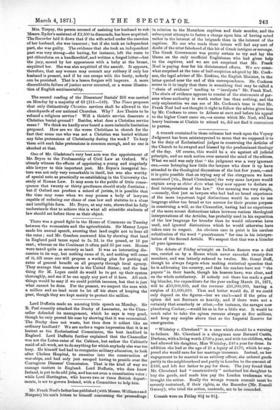A remark contained in these columns last week upon the
Voysey Judgment has been misinterpreted to mean that we supposed it to be the duty of Ecclesiastical judges in construing the Articles of the Church to be swayed and biassed by the predominant theology of the day. Of course, this would be a sin against all judicial principle, and no such notion ever entered the mind of the editors. What we said was only that" the judgment was a very ignorant one,‚ÄĒone betraying how little the lawyers who drew it up have attended to the theological discussions of the last few years,‚ÄĒand it is quite possible that on trying any of the clergymen we have mentioned [viz., Broad Churchmen] the very same lawyers would explain away as ¬įbiter dicta what they now appear to declare as final interpretations of the law." Our meaning was very simple, ‚ÄĒnamely, that just as lawyers who had had no broad experience of the more important legal distinctions would be sure to use language either too broad or too narrow for their precise purpose in construing a will, so the Chancellor, having had no experience of the more recent distinctions taken between various theological interpretations of the Articles, has probably used in his exposition of the law language far broader than he would otherwise have used, and ignored distinctions which he would otherwise have taken care to respect. An obvious case in point is his careless substitution of the word " punishments " for sins in his interpre- tation of the Second Article. We suspect that that was a blunder of pure ignorance.


































 Previous page
Previous page